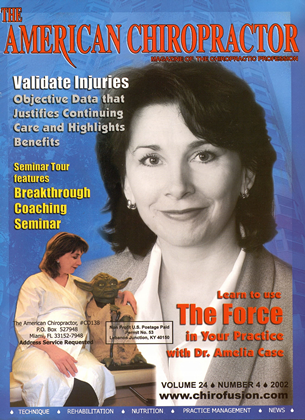A chiropractor wrote me a letter describing an extraordinary real life drama involving his 7-year-old daughter; we'll refer to her as Amy. In summary, his daughter was running a fever, lethargic, and experiencing excruciating abdominal pain. She was brought to the emergency room of a highly esteemed local hospital. He advised the emcr- gency room staff that he was a chiropractor and would be adjusting his daughter while they were running their tests. The ordeal lasted several hours. As he adjusted her, and the tension in her spine continued to release, Amy was feeling better and eventually fell asleep. Finally, a surgeon entered and declared that there was a high probability that Amy had appendicitis and, therefore, a surgery was warranted. The surgeon stated ominously that, if the organ were not removed, and burst, it could be fatal (fear, fear, fear). Then, when the surgeon manually examined Amy's abdomen, he was shocked that there was no longer any discomfort or sign of guarding. Now, it was recommended that Amy go home and be monitored. Surgery avoided. Adjustments aren't a cure for appendicitis, but rather remove disturbance in the body's communications and environmental perceptions. This allows the body to return to its natural state of dynamic, ever changing balance and, thus, better adapt to internal and external stresses in the environment. If you have ever had your child in the emergency room, you know that this good father and chiropractor went through a great deal of psychological stress. As an ironic epilogue to the story, this chiropractor, the very next week, learned from one of his practice members of a girl Amy's age who had gone to the very same hospital, had an appendectomy, went home, and died. That might also have been Amy's story, had her father not been a chiropractor, who, in a time of crisis, did not abandon his principles and, as a result, did think to adjust his daughter. There are no guarantees one way or the other, which is why, many times in a crisis, we feel helpless in trying to make a decision, knowing that a wrong decision may lead to death. When things like this happen around you, you start to refocus on your values. You start to reflect upon the meaning of life. In essence, you wake up consciously and become philosophical—philosophy being the study of existence. The more accurate you are about the study of existence, the better chances you and those who depend on you have for survival and thrival. Do you have a philosophy? Is it clear to you? Has it been developed consciously? What separates humans from all other forms of life is our ability to form and develop abstract concepts. As we develop consciously, we form wider and wider abstractions. People who do not live consciously never mature intellectually and end up dealing with the world as an infant, in a perpetual state of helplessness, unable to make sense of anything. The only difference is that, as children, we have a sense of wonder about the universe, which leads to a psychological state of awe and inspiration. But, if our mothers, fathers, teachers, and preachers fill our heads with contradictions and fears, and we surrender our conscious minds to dogma and contradiction, this beautiful sense of wonder becomes displaced with a sense of dread and a cry for survival. Inspiration is mutated into fear. Because an infant does not have enough input to form wide abstractions, everything it encounters is new and must be processed. Decisions about what to do must be made up moment by moment. As abstract concepts grow wider in context, positive decision-making becomes easier. Apply this to your practice. Apply this to your relationships. Apply this to your life. Why do you do what you do? Is it based on something well thought out and understood? Is it based on a philosophy that you developed for yourself? Your life or someone else's may depend on this. You have developed and, through your practice, express principles of | chiropractic. Are they core values that you hold as a part of the nature of existence? If| your child is in crisis, as the child was in the story described above, do these principles help you make decisions in uncertain, life threatening circumstances, or are they summarily abandoned out of fear? Are you for real or are you an act? These are serious questions with serious consequences. My goal here is not to moralize or tell you what to think, but to get you to think. So what is it all about? What are the premises behind your thinking and the motives behind your actions? What is your view of how the universe works? If you don't have your own, well thought out answers to these difficult and com- plex questions, this is your wake-up call to get to work on them and live consciously. To quote Ayn Rand, "As a human being, you have no choice about the fact that you need a philosophy. Your only choice is whether you define your philosophy by a conscious, rational, dis-ciplined process of thought and scrupulously logical delibera- tion—or let your subconscious accumulate a j unk heap...." The choice is yours. A 1983 graduate of Life College, Patrick Gen tempo, Jr., D. C, is co-founder and CEO of the Chiropractic Leadership Alliance, in Maywood, NJ, and co-creator of the Total Solution program. An internationally renowned chiropractor, lecturer, and consultant, he has helped thousands of chiropractors achieve success and balance in their lives. For information about CLA seminars, products, and services, call 800-285-2001, or visit Hwv.subluxation.com.
 View Full Issue
View Full Issue









